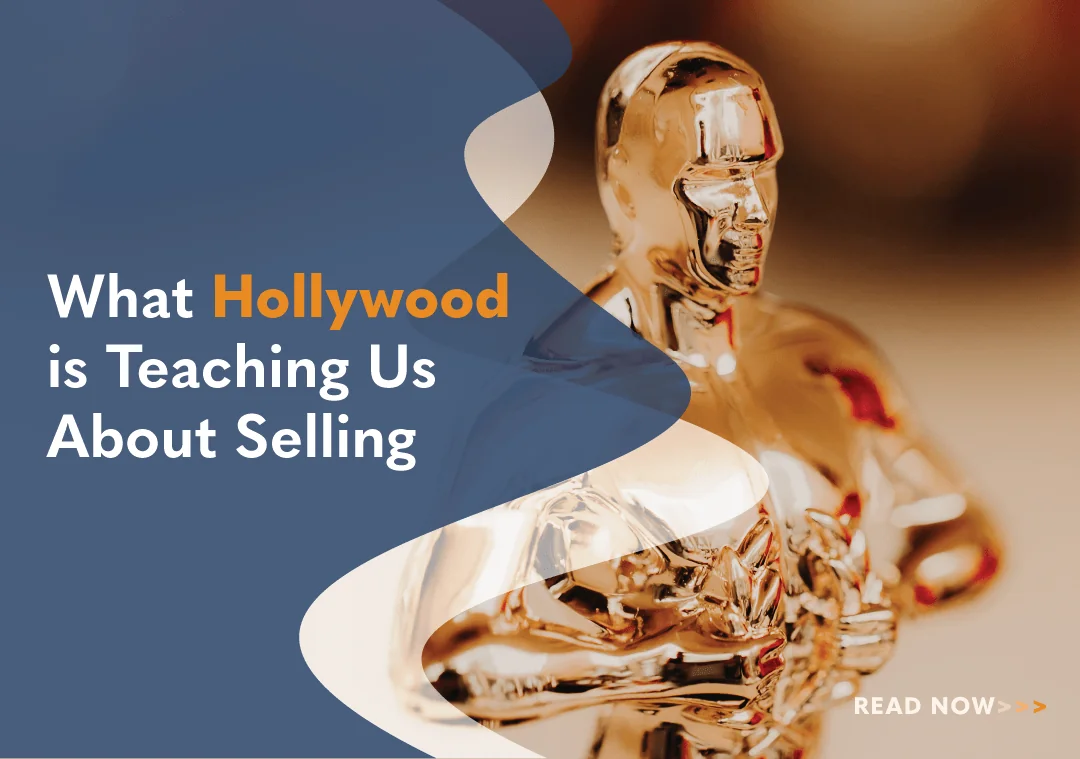What Hollywood is Teaching Us About Selling

“Put the coffee down. Coffee is for closers.” This is the famous line Alec Baldwin delivers in a sales meeting from the movie Glengarry Glenn Ross. Scriptwriters and the movie industry have undeniably impacted the selling profession positively and negatively. On the one hand, they have glamorized the world of sales, depicting charismatic and persuasive individuals who navigate high-stakes deals with finesse. This portrayal has helped elevate the image of sales professionals and inspired many to pursue sales careers.
On the other hand, the silver screen has also shed a negative light on the sales world, exposing manipulative tactics, cutthroat competition, and ethical dilemmas. Despite these nuances, sales and selling remain fascinating subjects for movies, captivating the public’s attention.
The allure lies in the tension and drama that arise from the pursuit of success, the intricacies of human psychology, and the dynamic interplay between persuasion and resistance. As a result, films exploring the art of selling continue to draw audiences and offer entertainment and thought-provoking narratives. In this article, we analyze three sales-themed movies, exploring the lessons and implications they provide for the art of selling.
Air
This movie recounts the captivating story of Nike’s relentless pursuit of Michael Jordan, offering a narrative that goes beyond basketball by exploring themes of persistence, visionary thinking, and intricate business negotiations. Despite Jordan’s initial preference for Adidas, Nike presented an unparalleled offer of $250,000 per year, along with the groundbreaking concept of creating a customized line of basketball shoes called Air Jordan, a pioneering move no other shoe company had ventured into.
Despite having an agent, Jordan’s representative displayed minimal enthusiasm toward Nike’s proposal. However, an enterprising Nike employee responsible for signing basketball talent bypassed the agent and directly approached the ultimate decision-maker: Michael Jordan’s mother.
Recognizing the opportunity, Mrs. Jordan agreed to a meeting, and Nike seized the chance to make their pitch. However, Nike did not immediately close the deal, as Jordan was still contemplating offers from Adidas and Converse.
After several anxious days of waiting, Mrs. Jordan contacted Nike to convey their acceptance of the offer. She mentioned a seemingly minor issue: “There’s just one thing. It’s nothing, really. One minor provision. It’s so obvious an omission I assume it’s a clerical error.” The enthusiastic Nike sales representative, played by Matt Damon, was eager to accommodate any request.
At that moment, Mrs. Jordan requested a percentage of every shoe sold under the Jordan name, creating another hurdle to the deal. Revenue sharing had never been done before in the history of shoe deals. Nike eventually agreed to the provision, and first-year sales hit a record $162 million worth of Jordan shoes.
The sales lessons are clear. Despite facing discouragement from higher-ups at Nike and Jordan’s agent, the determined sales rep relied on intuition and unwavering belief in his vision to win over Michael Jordan. Significantly, Mrs. Jordan shared the same faith in her son and steadfastly asserted the importance of a revenue share, clarifying her stance by saying, “You eat, we eat. That’s all he’s asking.” This story underscores the significance of persistence, conviction, and finding win-win partnerships within sales.
Glengarry Glenn Ross
This movie is popular in the sales community due to its abundance of memorable sales lines. It is hard to forget Alec Baldwin’s portrayal of a sales manager emphasizing the mantra, “A-B-C. A-Always, B-Be, C-Closing. Always be closing.” But this story is more a cautionary tale of what can go wrong when ambition overrides integrity rather than a story of perseverance in the face of sales rejection.
Glengarry Glen Ross follows a team of sales reps competing against one another to sell the most plots of land. The stakes are high when the aggressive sales manager explains the conditions of the new sales contest. “We’re adding a little something to this month’s sales contest. As you all know, first prize is a Cadillac Eldorado. Anyone wanna see second prize? Second prize is a set of steak knives. Third prize is, you’re fired.”
The movie depicts sales reps facing the pressure of job security resorting to unethical tactics, including lying, flattery, burglary, and stealing leads to sell to a competitor. It serves as a cautionary tale, illustrating what not to do in leading a sales team and conducting sales calls.
Modern buyers dislike aggressive closing techniques. The widespread presence of the mantra “Always Be Closing” promotes a close-at-all-cost attitude. While generating sales is crucial, unrealistic pressure can lead to adverse performance outcomes and unethical conduct. It is concerning that such unethical behavior could exist in sales today. The behavior portrayed in this film is a recipe for sales disaster, not sales success.
The Pursuit of Happyness
“The Pursuit of Happyness” is a movie for anyone going through a sales or life slump. Based on a true story, it follows Chris Gardner, a homeless father who faces immense struggles in sales but eventually becomes very wealthy.
One subtle yet powerful takeaway from the film is the removal of ego. Chris finds himself in a job interview wearing dirty clothes from his previous day’s work, painting a house. Many candidates would skip the interview, but Chris did not. The interviewer asks: “What would you say if a man walked in here with no shirt, and I hired him?” Chris responds with humility, saying, “He must have had on some really nice pants.”
This situation highlights the central theme of taking the next step and doing whatever is necessary. Despite challenges, Chris secures an entry-level sales job that involves extensive cold calling. Limited to working only six hours due to picking up his son from school, he outperforms his colleagues with discipline, focusing on quality work rather than the sheer quantity of sales activities.
Another critical theme in the movie is that the path to sales success is paved with setbacks. Unlike the sales reps in “Glengarry Glen Ross,” who resort to unethical behavior and shortcuts, Chris meets sales challenges with a stoic philosophy, making the best of the cards he is dealt. He understands that sales success requires sacrifice and emphasizes the importance of making progress. “Taking baby steps counts” is one of his lines.
Towards the end, Chris imparts valuable advice to his son, saying, “Don’t ever let someone tell you, you can’t do something. Not even me. You got a dream; you got to protect it. People can’t do something themselves; they want to tell you that you can’t do it. If you want something, go get it. Period.” This phrase should be written on the walls of sales offices everywhere.
Chris discovers his dream of becoming a stockbroker when he sees a man stepping out of a Ferrari. Intrigued, he asks the man about his profession and realizes that a college degree isn’t necessary, but being good with numbers and people is key. Chris uses the pursuit of selling stocks as a means to achieve his dream of success, security, and happiness for his family. When he enters the stockbroker’s office for the first time, he reflects, “They all looked so happy to me. Why couldn’t I look like that?”
“The Pursuit of Happyness” is an exceptional film that inspires individuals in sales and life, emphasizing the importance of resilience, humility, perseverance, and pursuing one’s dreams. It reminds us that even in the face of adversity, we can find happiness by refusing to give up. Sales professionals cannot go wrong pursuing sales with the tenacity and determination of Chris Gardner.
In Conclusion
While sales movies can be a valuable source of inspiration for sales professionals, it is essential to distinguish between the fictional portrayal and the real-world complexities of sales. Applying the lessons wisely and using movies as a source of inspiration can greatly enhance a sales professional’s drive toward achieving their goals in the ever-evolving sales world. Sales films are also an excellent source of creativity to inspire outside-the-box thinking.
However, as sales professionals, it is crucial not to romanticize or idolize the negative behavior depicted in certain movies. Hollywood has mastered captivating audiences with stories centered around the drama of sales. Movies can be an excellent way for sales professionals to contemplate business decisions and their consequences. While life may imitate art, sales professionals must remain mindful of the lens through which they interpret the story.

- Account Planning (11)
- Awards (49)
- Client Testimonial (37)
- Personal Branding (19)
- Podcast (11)
- Research (70)
- Sales Career Development (87)
- Sales Coaching (156)
- Sales Consulting (137)
- Sales Culture (170)
- Sales Enablement (354)
- Sales Leadership (110)
- Sales Management (248)
- Sales Negotiation (16)
- Sales Prospecting (124)
- Sales Role-Playing (18)
- Sales Training (234)
- Selling Strategies (263)
- Soft Skills (70)
- Talent Management (94)
- Trusted Advisor (27)
- Virtual Selling (49)
- Webinar (9)

























